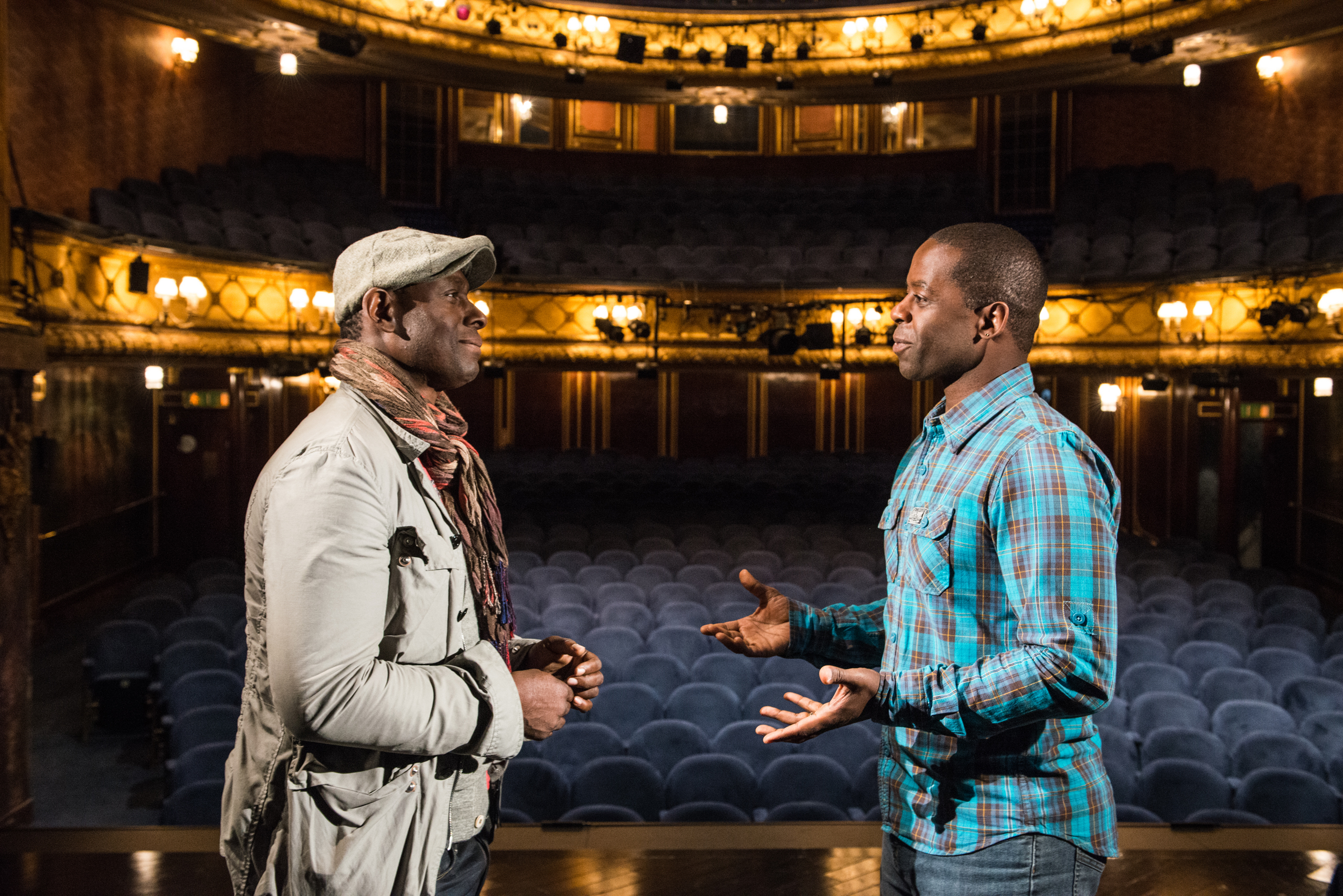The unlocked door: a manifesto by the new executive director of the Transom Story Lab

Amanda Kowalski
The unlocked back door at Clark House, Woods Hole, Mass.
This commentary first appeared on Transom’s website and is republished here with permission.
Intro from Jay Allison: We have a significant, happy announcement to make here at Transom. The redoubtable Sophie Crane is joining us as Executive Director and leading the next iteration of our organization: the Transom Story Lab. We’re thrilled. Sophie comes to us after many jobs in podcasting, public radio, teaching, and more. All of us here have worked with Sophie before and we know how efficiently she gets things done — with strength and resourcefulness and heart. She’s a force and we trust her. From my point of view, as we approach Transom’s 25th anniversary, this feels like a great time to share the leadership. Transom began in the mission of public radio and has stayed true to that. Everything around us has become more commercialized, but we know there’s still a vital role for stories outside the marketplace. Those of us drawn to public radio in the early days wanted to dedicate ourselves to principles beyond financial success. We were drawn to the social purpose, the commitment to art, the power of a group of talented people pulling together with the same goals. The new Transom Story Lab is designed to champion all of that for the next 25 years and beyond. And I know Sophie will help get us there. Sophie has written a lovely inspiring manifesto about why she’s taking on this job and what she intends to build here with us. It represents some hope and purpose in a difficult time and we can all use that. Check out this exciting vision and join in. As for me, Jennifer Jerrett, Sydney Lewis, Viki Merrick, Rob Rosenthal, and the rest of the Transom family, we’ll be right here, working hard to make this happen. More to come …
Jay Allison, Transom’s founder, loves to tell a story about how in the 1970s he snuck in an unlocked back door of the old NPR building on M Street in downtown Washington, D.C., borrowed their equipment, and learned his trade.
Transom.org was designed to be that unlocked back door for anyone interested in becoming an audio documentarian. But Transom has never just been a door — it is also a whole crew of people standing by that door, holding it open, inviting you in, asking what you need.
I am one of the people who found that door and was welcomed inside.
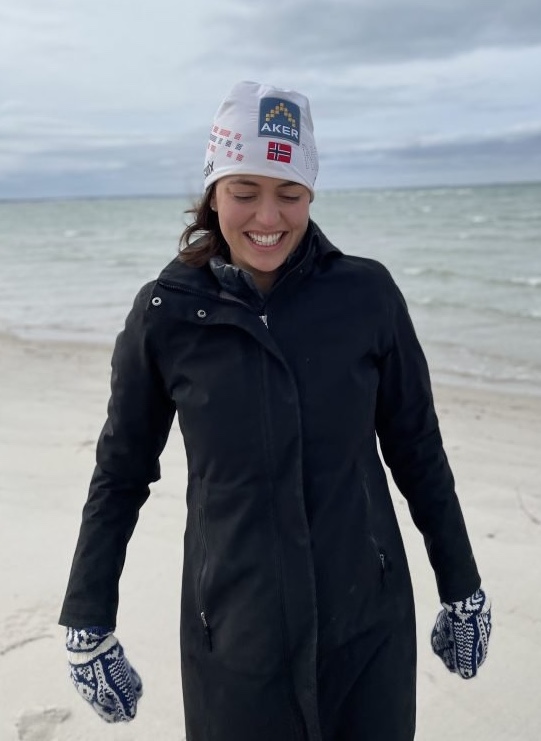
I grew up in the Adirondack Park and then later in rural Vermont, both places that still don’t have cellphone service. We didn’t have a TV (the first time I saw one I said, “Look Dad, a radio with pictures!”), and I’m about the youngest generation to remember childhood without the internet, and then, with dial-up. My parents got the New York Times, but we lived so far out there that it showed up a day late. What we did have, and in abundance, was radio. It wasn’t fancy — the NPR affiliate in the Adirondacks, North Country Public Radio, is housed in the top of a small hospital. The engineer once took me out to one of the transmitter sheds and told me to watch out for snakes. He wasn’t kidding.
But NCPR is terrific. It covers a massive listening area — larger than Yellowstone, Yosemite, Glacier, Grand Canyon, and Great Smokies National Parks combined — with fewer than 20 full-time staff. Somehow, or maybe because of all of that, it is one of the best stations in the country. My dad chose our house, in part, because — though it was kind of falling apart — NCPR came over the airwaves nice and clear, bringing us news of our community as well as from the larger world.
So I’ve been listening for a long time.
A Transom return
I’ve been incredibly lucky to have made my living so far getting to report and produce and commission and edit stories, learning from some of the best makers there are — including at NCPR, where I had my first job. From there, I worked in public media and for podcasting companies, but no matter what I did, I kept coming back to Transom — reading new articles published on the website, or just showing up for a meal and some encouragement. For a while, I assisted Rob Rosenthal, lead instructor of the Transom Story Workshops, an experience that made me realize the power of teaching. Later, I taught at Dartmouth, and then the eighth-grade classroom in Thetford, Vermont, always using the tools and philosophy provided by Transom. As the commercial podcasting world began to tamp down on risk-taking, my students kept making weird and surprising stories animated by the joy I’d always found in making radio.
I’ve come back to Transom as the new Executive Director because I want to create even more space for that.
I’m humbled and excited to join the remarkable people who have been holding that unlocked back door open for others for almost 25 years. But I’m even more excited at the prospect of helping ignite the next 25 years. The need is crucial: With the decimation of local news coverage, the voices that dominate our national life are strident and shouting — too often they try to drown out others by simply raising the volume. But Transom knows how to amplify, first by listening, then building in subtlety and nuance and depth, and right there in that process reintroducing neighbors to each other. The tools of audio storytelling and documentary have never been as needed as they are today.
A sacred way
Some context for our work together: Transom went online in 2001, near the dawn of the internet era, amid utopian ideals about the democratizing power of the World Wide Web. The hope was that the open internet would surface new voices, make it easier to share ideas, spread the mission of public radio, maybe even free us from the broadcast clock.
If that context seems naive now — if the internet as a whole is less torch-lighting-the-future and more dumpster fire — Transom itself has never wavered. It was the first website ever to win a Peabody Award and has kept alive a well-lit corner of the web that exudes generosity, inspiration, and usefulness, and that has deeply influenced the way stories are made and told in public media and in podcasting. Transom is about democracy. It’s about creating stories that help us listen to each other across class and cultural divides, about using humor and truth and documentary to cultivate a sense of neighborliness.
The elements of that daily work are both mundane and just a little sacred — the world’s greatest producers come to this site to share their secrets, for free, and in the hopes that others will infuse what they learn into their own work and beyond. They’ve produced the majestic Transom Specials that certainly would never have been supported elsewhere. They’ve drawn in many teachers across disciplines and grade levels who mine Transom’s archive to share wisdom and inspiration with their students — as I do for mine.
But Transom’s reverberations have been deeply felt offline, too. The Woods Hole-based radio residency known as the Transom Story Workshop changed the careers of scores of radio producers who have since gone on to permeate every corner of the industry.
I know this in part because I’m married to one of them. (Let me hasten to add that though I’ve had the pleasure of teaching at the workshop over the years, he wasn’t one of my students!) I know this as well because I’ve used Transom’s resources constantly throughout my career. I’ve left the world of Big Podcasting to run this organization. That’s how much I believe in this work, a belief I very much want you to share.
Why this matters
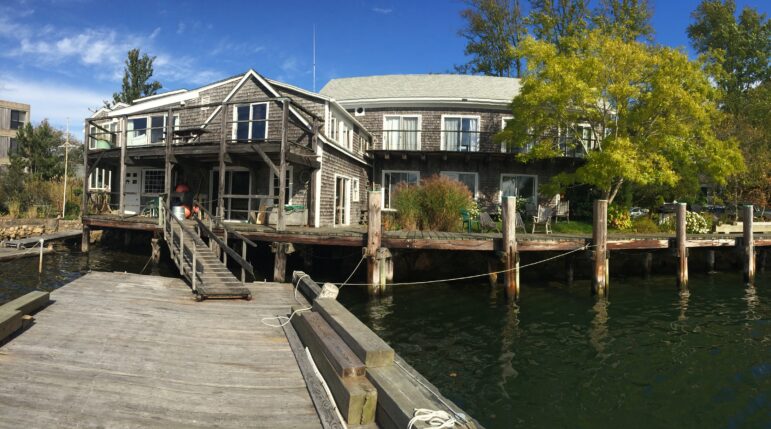
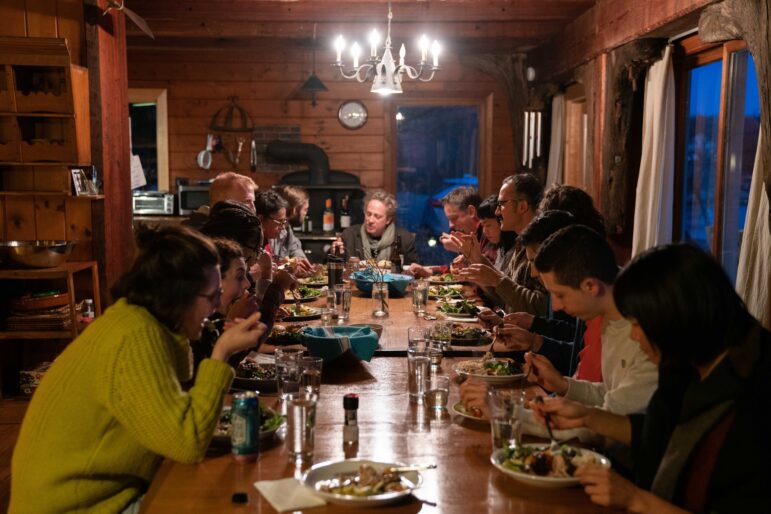
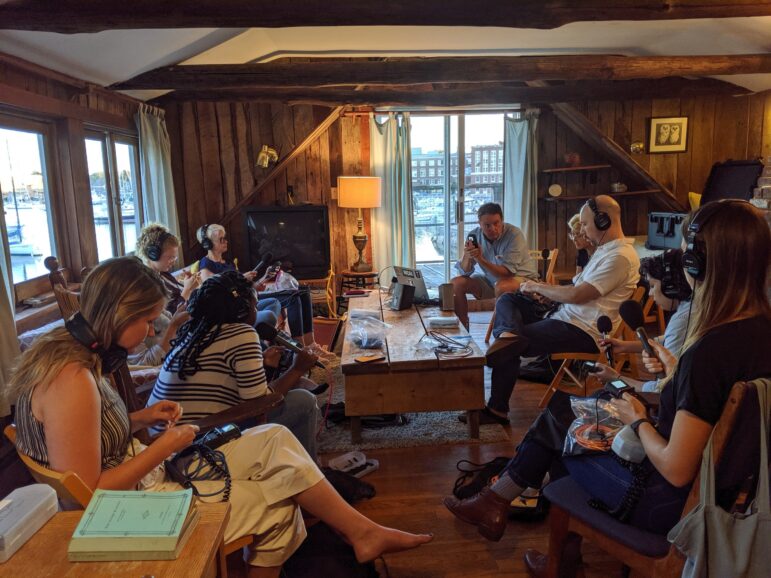
The Clark House, a summer rental that housed students attending the Transom Story Workshop, was built from wood salvaged from shipwrecked boats. Downstairs there was a huge dining table, and upstairs, a little room where students would gather after dinner to learn from the masters of the craft. The night I remember most from the time I helped teach the workshop was Nov. 10, 2016, the day after the election. Daniel Alarcón from Radio Ambulante was there, and he was reading poetry.
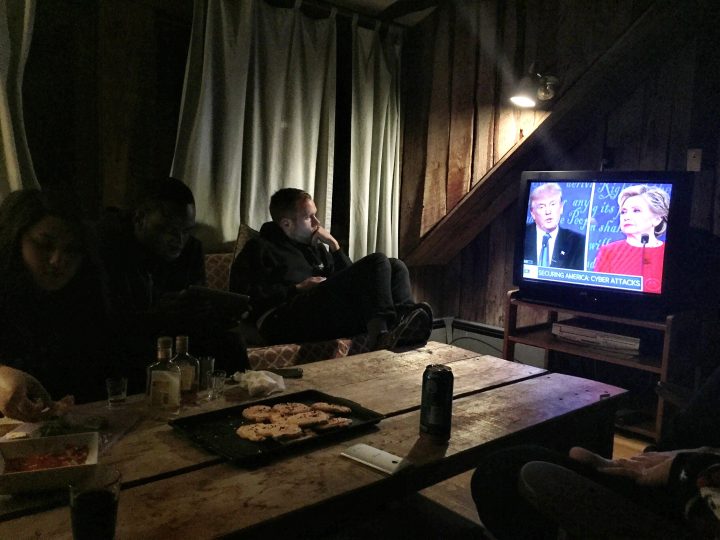
The students gathered in that little room felt, I think, the weight of the work that they would embark on when they graduated — it seemed imperative to tell real and humane stories, to really listen, to be people, not partisans, to try to understand how such a silent crevasse had formed between neighbors. I was struck by this idea that we were there together — inside the bones of some boat — learning how to use stories to help us sail these seas in a storm.
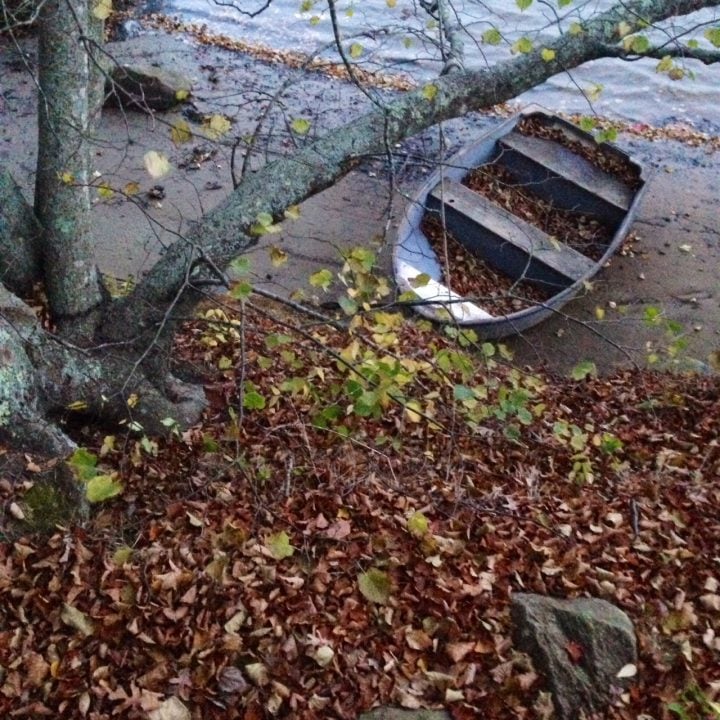
In the eight years since, things have only become more complicated. In 2024, it is hard to feel particularly utopian about anything. Abroad, war abounds. At home, division and violence and discontent. Around us, the sea quite literally rises. In the world of radio and podcasting, we’ve seen layoff after layoff. But try to put aside the protective shield of cynicism for a moment and hear me out — there’s still something mystical about the way that stories told in sound exist out in the air, all around us, just waiting for a car radio to click on or an earbud to find its Bluetooth.
In a recent talk, Jay said, “Sound gets inside us, through our lidless ears, and inhabits us. Hearing is the first sense to be switched on in the womb and the last to leave us before death. There is uncanny power in stories told in sound.”
At Transom we’ve always taken it on faith that this intimate medium has unparalleled power, but it turns out there’s actual science to make the case. fMRI scans show that when someone is listening to a story, their neural circuits start to align with the neural circuits of the person they are listening to. Some scientists think this creates unique possibilities for shifting perspectives, something that in our current media climate is increasingly difficult to do. Listening to each other is a large part of what creates a community that we want to live in.
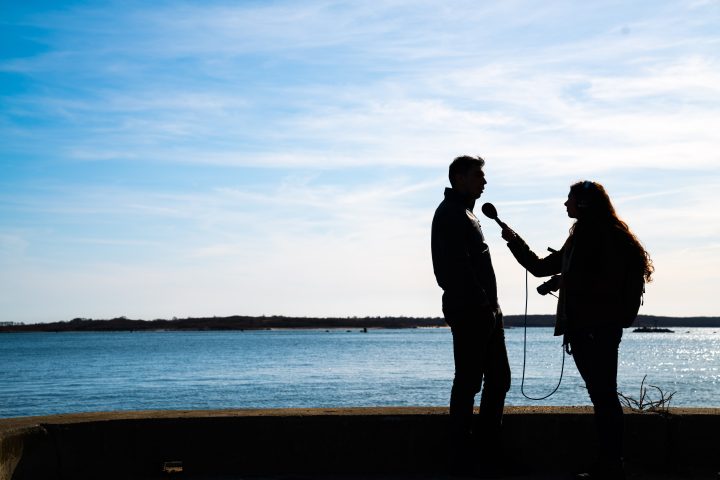
But the stories that do this best can easily get drowned out. In our noisy world, the emphasis is solely on the immediate news. Great reporting is, of course, essential, and one of the things we do here. But the churn of daily events and the ubiquitous “BREAKING” chyrons often stand in the way of discovery — about how our world actually works and about what we actually want. If the human experience is a 360-degree circle, the news focuses on only about 10 degrees of that arc: politics, money. But that leaves out everything else: the people and places we love, the ways our minds and hearts work. Radio is about specific people and specific places, and the best audio stories make those experiences universal. They shatter some of our assumptions and leave us open, not closed.
The sunlight of stories
Transom has always known stories don’t have to be huge or classically “important” in order to matter. Erica Heilman, who produces the Peabody Award-winning podcast Rumble Strip, said that as she set out to create her show she wanted to make “stories about all the unimportant things that happen between the important things.” And she said that nobody thought that was a good idea — “except the people at Transom.”
And that’s why this work matters more than ever, because in this moment where the chasms that have formed between neighbors — politically, socially, economically — are so deep they feel almost impassable, the resources to make stories that might help us bridge them are disappearing.
All around the country, public radio newsrooms are laying off staff, cutting podcasts, offering fewer and fewer long-form features. There are fewer and fewer reasons to linger in the driveway after the engine is turned off. At the big podcast companies, it’s become clear that market economics don’t often support long-form, artful documentaries. More and more, “podcasting” has become synonymous with “two dudes rating movies” or “dead lady found in bushes.” Instead of using the freedom of podcasting to make something beautiful and strange, many companies are focused mainly on making the same thing over and over, in the often forlorn hope of making money.
StoryCorps founder Dave Isay said, “The folks at Transom have taken the time to gather the collective knowledge of everyone in public radio and created this font of wisdom that people have benefited from for years and will continue to benefit from. It’s a national treasure.” Transom shores up that history and houses that archive, but mostly it continues to open this world to new voices, new perspectives, and new tools.
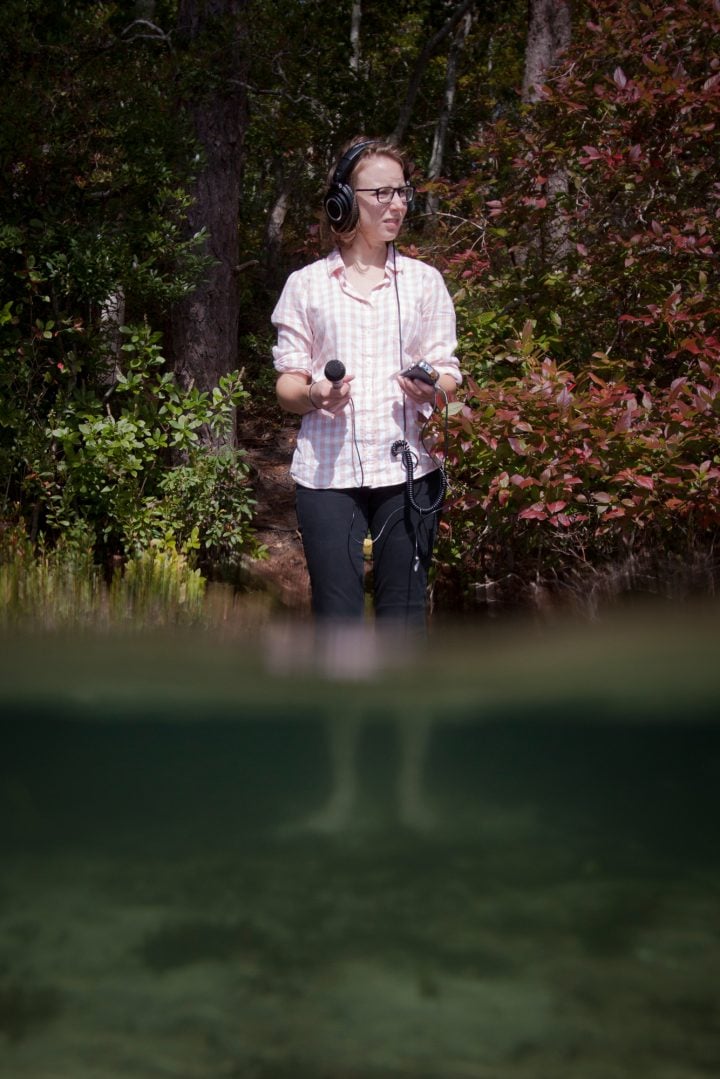
While I was writing this small manifesto, for instance, an email arrived from a pastor in Southern California. He’d learned from our resources — especially Rob Rosenthal’s terrific podcast Sound School — and he created a podcast featuring the voices of young people in his church saying things they hadn’t felt comfortable saying before. He wrote, “I wanted you to know your work has helped produce something that has become meaningful in my life, and many others who have expressed gratitude to me for this project.”
Everyone’s voices need to be heard — especially the softer voices, the ones that tend too often to be muted in our national din. WCAI, the small radio station in Woods Hole founded by Jay Allison, has as a goal to have the voice of every member of the community on the radio. What would it look like if every public radio station across the country had a similar goal?
There isn’t enough support for stories that are poetic, weird, noncommercial. We’ll be a place that nurtures that work, helps it grow, and gives it sunlight.
Thinking audaciously
In the coming year, we will launch the Transom Story Lab. It will house everything Transom already is — the website, the podcasts, the archive, the tools — and, with a spirit of experimentation, it will be much more. This is Transom’s biggest and most ambitious project yet.
Here’s what we’ll be up to over the next five years while we’re on our way to developing a world-class institute for the audio arts:
- Holding workshops for audio producers, for people who hope to become audio producers, and for people who want to learn how to use the tools of audio storytelling in other lines of work. This includes scientists (integral to our community in Woods Hole), and people in helping professions like nurses, firefighters, aid workers, just for starters.
- Designing a curriculum for educators at every level so that learning to tell stories in sound becomes as accessible as learning to tell stories in prose.
- Creating a world-class residency program primarily for audio storytellers. We will welcome creators to find inspiration, produce stories, develop new skills, and build community.
- Hosting a regular festival that brings together makers from all over the world to learn from each other and celebrate the joy of audio arts.
- Experimenting with new ways to get community voices on public radio, including a vast expansion of the Sonic ID project at stations across the country, and a collaboration with public libraries.
- Creating a program tentatively called “The Listeners,” an experiment in poetry and place that will support narrative artists in making exceptional podcasts that resonate locally and nationally.
- Convening gatherings between journalists and scientists to invigorate and enhance the way important scientific information reaches people in their homes (or where they live).
- Significantly growing the audience and reach of the Sound School podcast.
- And, through the Transom Specials, commissioning new and unexpected work that wouldn’t find a home elsewhere.
Everything we do will be in service of actually hearing one another, propelled by the belief that if we all get just a little better at listening, the world will be a better, fuller, more flexible, and way more interesting place to be. It’s clear that mission-driven work is endangered by the fast-growing commercialized audio industry. In everything that it does, the Transom Story Lab will buoy the makers of work driven by creativity and integrity in the service of the public good. We will embrace those values and champion them.
In sum, the Transom Story Lab will create a place where creators can find the community, resources, and public-spiritedness to take the risks that significant work requires — the kind of work that can genuinely bring people together.
Our hope is to serve as a model and collaborator for new media centers around the world similarly committed to powerful storytelling in audio and other media.
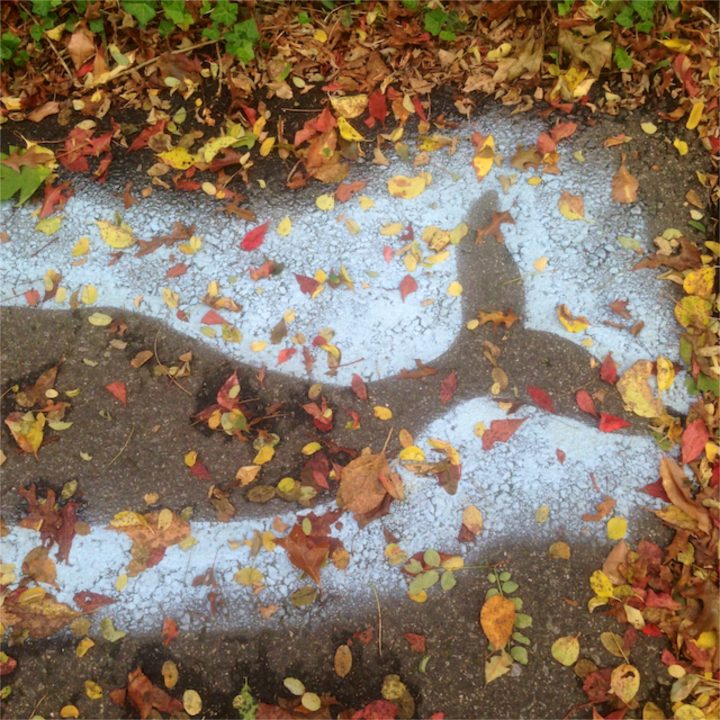
When I started making audio documentaries, someone told me that a cool thing about radio was that I could just call up anyone else who was making this stuff and ask for their help and advice. This seemed unlikely but turned out to be entirely true. More than anything, I want Transom to always embody that generosity and big-heartedness and carry it forward to the next generation of people telling true stories in sound.
Producer Sarah Vowell once said that radio is “the one mass medium still made by true believers.” She said this a while ago. I’m not sure it’s totally true anymore. But if you’re a true believer, or even just a little curious, drop by Transom. The door will be open.
P.S. — We’d love to hear from you! Shoot us an email here. And if you want to stay in touch, sign up for our newsletter here.
Kind words about our new lab
“Dreamers need tools and tools need dreamers, and that’s why we need a lab like this: to explore and to set new standards for what’s possible.”
— Robert Krulwich, Radiolab
“The potential here to inspire and impact the media landscape as we know it today — from the individual to the collective experience — is vast and thrilling!”
— Julie Shapiro, AudioFlux
“We’re in a time when commercial resources for thoughtfully produced audio storytelling are contracting and centralizing. Our medium needs this new kind of model to enable a broad diversity of makers to craft innovative and nuanced narratives for our ears.”
— Anna Sale, host and managing editor of Death, Sex & Money
“The Marine Biological Laboratory supports the Transom Story Lab as they enable scientists and journalists to become better partners in the science communications process.”
— Nipam Patel, director of the Marine Biological Laboratory
“The Transom Story Lab is a spot-on idea. The pioneering residency will seed new works and forms, build community and new, unimagined collaborations. It will nurture the soul of the system and those of the people who feed and fuel it with their stories and groundbreaking storytelling forms and visions.”
— Davia Nelson, The Kitchen Sisters
Sophie Crane is a documentary radio producer, editor, and the executive director of the Transom Story Lab. Sophie also teaches audio storytelling at Dartmouth College. She lives with her husband (TSW ’15) and their baby son in Vermont. Previously, Sophie was an executive producer and senior editor at Pushkin Industries, where she created shows like The Last Archive with Jill Lepore and edited shows like Rick Rubin’s Broken Record. Sophie has also worked for the PBS series Frontline, where she helped establish an investigative podcast, The Frontline Dispatch. Sophie’s work has won a number of awards, and she was part of the team that was awarded a duPont-Columbia Gold Baton for the first time in a decade. More information and Sophie’s full portfolio can be found at her website. When not at work, Sophie can generally be found off in the woods listening to something good with her dog by her side and her baby in a front pack.





